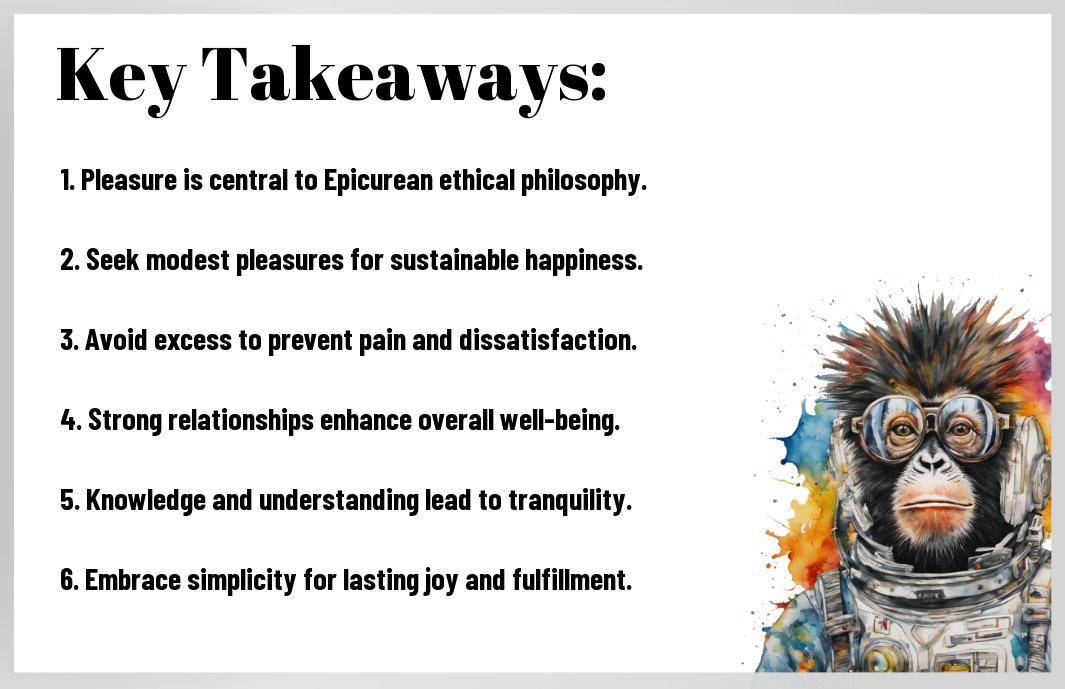
Newsletter Subscribe
Enter your email address below and subscribe to our newsletter

Enter your email address below and subscribe to our newsletter

With a simple yet profound approach, Epicurean ethics can illuminate our path to happiness. In this post, I’ll explore how understanding these principles can enhance your well-being and lead you toward a more fulfilling life. By focusing on pleasure and the avoidance of pain, you’ll discover the balance you need to navigate your daily choices. Let’s examine the world of Epicurean thought and see how it can transform your understanding of happiness.


Any discussion about Epicureanism naturally begins with Epicurus himself. Born in 341 BCE on the Greek island of Samos, he was a philosopher who questioned the traditional views of happiness and sought a clearer understanding of what brings true fulfillment in life. I find it interesting that he wasn’t just a philosopher locked away in a study; he founded a community known as the Garden, where he and his followers engaged in discussions about life, happiness, and ethics. His ideas encouraged people to think for themselves and prioritize their own happiness over societal expectations.
Behind the name Epicurean often lies a misconception that it solely embodies indulgence in physical pleasures or hedonism. However, I have come to appreciate that Epicurus defined pleasure as the absence of pain and disturbance. For him, true pleasure is found in the pursuit of tranquility, simplicity, and friendship. This philosophical view encourages us to reflect on our desires and choose those that contribute to our long-term joy rather than momentary satisfaction.
And while many may envision Epicureanism as a free-for-all of hedonistic pursuits, it is quite the opposite. Epicurus advised moderation and self-control as key components of a happy life. By focusing on the joy derived from simple and natural pleasures, like a beautiful sunset or a good book, rather than chasing after extravagant or fleeting experiences, I believe we can begin to align our lives closer to the core principles of Epicurus. This balanced approach allows us to cultivate a sense of lasting happiness that transcends momentary pleasures.
If you’ve ever found yourself contemplating what it really means to be happy, Epicurean thought offers rich insights into this timeless question. Happiness, for Epicurus and his followers, is not simply the feeling of fleeting pleasure, but rather a state of enduring contentment achieved through the pursuit of a life well-lived. I believe this deeper understanding invites us to reflect on our values and the choices we make, encouraging us to seek not just ephemeral joys but lasting fulfillment in our daily lives.
With that said, happiness in Epicurean philosophy is defined as a life filled with pleasure and the absence of pain or distress. This dual approach highlights the importance of enjoying simple pleasures while also cultivating a mental state that minimizes disturbances. I find it fascinating how Epicurus emphasizes a balanced life, where we carefully weigh our desires and make conscious choices about what brings us true joy, rather than getting swept away by immediate gratification.
Ataraxia, a central concept in Epicurean ethics, refers to a serene state of mind free from turmoil and anxiety. At its core, it embodies peace and tranquility, allowing us to appreciate life’s simple pleasures without the distractions of fear or worry. As I explore this idea, I realize that cultivating ataraxia can significantly enhance my happiness, enabling me to enjoy deeper connections with friends, family, and nature.
Hence, the pursuit of ataraxia is crucial in Epicurean thought, as it lays the foundation for genuine happiness. By striving for inner calm, I’ve found that I can better manage life’s ups and downs, maintaining a consistent sense of joy that isn’t easily shaken by external circumstances. This approach encourages us to minimize anxiety and focus on what truly matters, aligning our lives with our values and fostering a more fulfilling existence.

All of us seek pleasure in various forms throughout our lives, but how we define and pursue that pleasure can differ widely. In Epicurean thought, pleasure is seen as the highest good, and understanding the different types of pleasures can help us cultivate a more fulfilling life. This exploration begins with recognizing that pleasures can be categorized into physical and mental, with each playing a significant role in our overall happiness.
Along this journey, I find it vital to classify pleasures into different types to better understand their impacts on my life. Here are some examples:
After recognizing these categories, it becomes easier to seek out experiences that truly enhance our well-being.
On the path to happiness, moderation plays an important role in how I approach pleasure. Engaging in excessive indulgence can lead to negative consequences, often overshadowing the joy that pleasure should bring. It’s about finding that balance between savoring life’s delights and ensuring they don’t become overwhelming or detrimental to my health and relationships.
The key principle in Epicurean ethics is that the best kind of pleasure is one that leads to peace of mind, and moderation can help achieve that. By adopting a thoughtful approach to enjoyment, I can cultivate enduring happiness without falling prey to excess. In your own life, I encourage you to reflect on how you can apply the concept of moderation to experiences you cherish, guiding you toward a more joyful existence.
Now, when I think about the Epicurean perspective on happiness, I can’t help but emphasize how vital friendship and community are to this philosophy. Epicurus believed that having strong social ties can significantly enhance our experience of pleasure and minimize our fears. After all, shared joy can be more fulfilling than joy experienced alone. When you surround yourself with caring individuals, you create a supportive environment that not only contributes to your happiness but also provides a network of security and understanding that’s hard to replicate alone. In essence, our relationships give life meaning, especially when challenges arise.
Below the surface of our everyday interactions lies the immense value of social connections, which Epicurus held in high regard. Having friends and engaging with a community can bring comfort and joy that enriches our lives. Through these connections, one is less likely to feel isolated and more likely to embrace the abundant pleasures life has to offer. I genuinely believe that when you invest in your social network, you cultivate an atmosphere where shared experiences amplify happiness, creating a beautiful cycle of support and love. It makes your journey through life feel lighter and more vibrant, as laughter and shared stories fill the air around you.
Before diving deeper into building meaningful relationships, I want to highlight that it’s not just about having acquaintances but nurturing connections with those who lift your spirits and share your values. True friendship, according to Epicurus, revolves around mutual respect, understanding, and a shared pursuit of happiness. It’s about being present for one another and cultivating a bond that encourages open communication, laughter, and genuine vulnerability. Those friendships that stand the test of time often have roots in shared experiences and a deep understanding of each other’s joys and struggles.
Social connections are like a garden; they require care, attention, and sometimes a bit of pruning to thrive. When I invest time and energy into building relationships, I find that they blossom into something beautiful. It is important to interact authentically with people, as this fosters trust and a sense of belonging. By engaging genuinely and showing appreciation, I discover that I can create a network of friends who enjoy life’s pleasures with me, providing support during lower moments. Nurturing these bonds brings me fulfillment and joy, important ingredients for a happy life according to Epicurean ethics.
After exploring into the depths of Epicurean philosophy, I often find that many people hold several misconceptions about what it truly entails. It’s often seen as a ticket to indulgence, where one can simply live a life of excess, gorging on pleasures without tomorrow’s worries. However, I believe that this oversimplification does a disservice to Epicurus’s teachings, which champion a more nuanced and thoughtful pursuit of happiness. Epicureanism emphasizes the value of moderation, wisdom, and the pursuit of genuine happiness through understanding the nature of pleasure and pain.
At the heart of these misconceptions is the myth that Epicureanism promotes an uninhibited lifestyle lacking boundaries. When I explore Epicurus’s teachings, I see quite the opposite. He advocated for simple pleasures—companionship, mental tranquility, and philosophical contemplation—as the true sources of happiness. It’s about savoring life’s little joys and avoiding unnecessary suffering. This perspective reshapes how we view happiness and pleasure, blending them into a harmonious experience rather than a hedonistic frenzy.
Across the philosophical spectrum, it’s important to distinguish Epicureanism from hedonism, as they often get mistakenly conflated. While hedonism might advocate for the pursuit of pleasure as the ultimate goal in life, Epicureanism takes a more thoughtful approach, suggesting that the pursuit of pleasure should be balanced with the avoidance of pain. For me, this makes Epicureanism a pathway towards a more enduring type of happiness, one that respects our limits and promotes deeper meaning.
But that doesn’t mean that Epicureanism dismisses pleasure altogether. Instead, it encourages a reflective exploration of what brings you joy. By prioritizing harmonious relationships, intellectual growth, and the cultivation of personal peace, Epicureanism guides you toward a fulfilling life. It’s about understanding which pleasures truly nourish your well-being and lead to a satisfying existence instead of chasing fleeting moments that might leave you feeling empty.
Your everyday experiences can really benefit from leveraging Epicurean ethics. I find that by focusing on simple pleasures, like enjoying a good meal with friends or taking a short walk in nature, I enhance my overall well-being. It’s about finding joy in the little things and prioritizing them over fleeting desires or materialistic pursuits. I’ve learned that creating a space for these small joys can truly enrich my life and make every day feel more fulfilling.
Also, it helps to cultivate meaningful relationships. Investing time in friendships and fostering a supportive community can bring immense happiness. In my experience, surrounding yourself with positive influences and engaging in heartfelt conversations can lead to a deeper sense of connection and contentment. I encourage you to explore your unique sources of joy and weave them into your daily routine.
Before you commence on the journey to achieve personal happiness, it’s vital to realize that it often stems from within. I believe that practicing mindfulness and being present can amplify this inner contentment. By tuning into my thoughts and emotions, I can better understand what truly brings me joy versus what simply distracts me. You might want to try keeping a journal to reflect on your experiences and uncover what makes you genuinely happy.
Also, it’s important to set boundaries and learn to say no when necessary. When I prioritize my time and energy on what aligns with my values and goals, I start to feel a sense of liberation. These small changes can foster a richer, more enjoyable experience of life, showing that happiness isn’t about constant pleasure, but rather a deeper sense of fulfillment in everyday moments. So, take a moment to reflect on your priorities and craft a lifestyle that resonates with your true self.
Hence, after diving deep into the teachings of Epicurean ethics, I find myself appreciating the nuanced understanding of happiness and pleasure that Epicurus offered. It’s not merely about indulging in transient pleasures but about cultivating a lifestyle that encourages genuine joy and fulfillment. By valuing simple pleasures and fostering meaningful relationships, I see how achieving a tranquil state of mind can lead to true happiness. I encourage you to explore more about how Epicurus articulated these concepts by checking out How did Epicurus define happiness and pleasure? Are …, as it beautifully captures the essence of his thoughts.
Ultimately, adopting an Epicurean approach allows you to navigate life’s complexities with a better understanding of what really brings joy. It’s about prioritizing personal well-being amidst the chaos of daily life, which I find incredibly valuable. I hope you, too, can embrace these principles and lead a life filled with contentment and serenity, guided by the wisdom of Epicurus. Cheers to finding our own paths to happiness!
A: The core principle of Epicurean ethics is the pursuit of happiness through the cultivation of simple pleasures, the absence of pain, and the development of friendships. Epicurus believed that the highest good is happiness, which can be achieved by living a life of moderation and thoughtful enjoyment of life’s simple pleasures.
A: In Epicurean philosophy, happiness is defined as a state of pleasure and the absence of suffering. It emphasizes intellectual pleasures and the enjoyment derived from philosophical contemplation, companionship, and the appreciation of nature, rather than the pursuit of wealth or luxury.
A: Friendship holds a significant place in Epicurean ethics; it is regarded as one of the most important sources of happiness. Epicurus believed that strong, supportive relationships with others enhance one’s life and contribute to a sense of security and joy, thereby elevating the overall quality of life.
A: Epicureanism advises individuals to address fear, especially fear of death, by understanding that death is simply the cessation of consciousness and should hold no fear. Epicurus argued that the fear of death is irrational, as the experience of death itself is not painful; true pain is felt only in life.
A: Simple pleasures are important in Epicurean ethics as they lead to a more fulfilling and tranquil life. Epicurus taught that by focusing on modest, everyday delights—such as good food, nature, and meaningful interactions—one can achieve lasting happiness and contentment without the excesses that lead to anxiety or suffering.
A: Epicurean thought categorizes desires into three types: natural and necessary (e.g., food, shelter), natural but unnecessary (e.g., luxury items), and vain (e.g., fame, power). Epicurus advocated for the fulfillment of natural and necessary desires while exercising restraint over the pursuit of unnecessary and vain desires, ensuring that one leads a balanced and happy life.
A: Yes, Epicurean ethics can be effectively applied to modern life. Individuals can cultivate happiness by focusing on the simple joys, nurturing friendships, and minimizing unnecessary desires. By practicing mindfulness and being present in everyday experiences, one can create a fulfilling life that aligns with Epicurean principles, leading to greater peace and satisfaction.